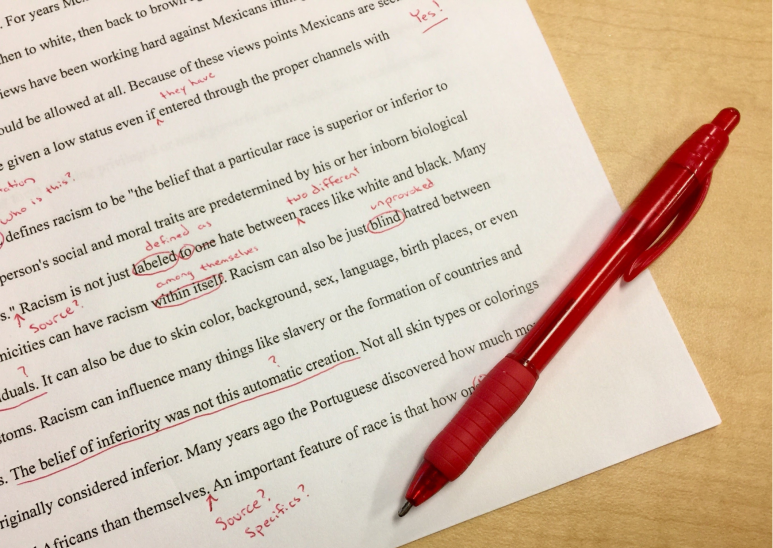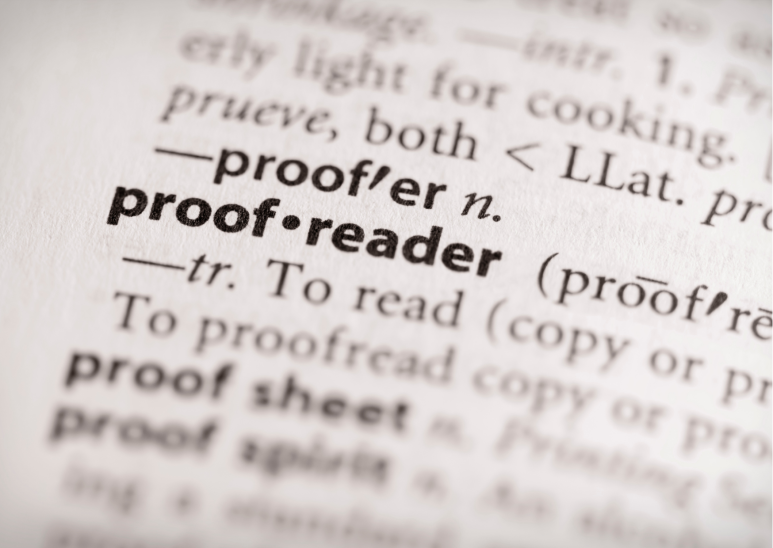Whether you are a native or non-native speaker of English, proofreading is essential to polish your writing. However, proofreading can be challenging for non-native speakers who do not know where to start. But before we go over the process, what exactly is proofreading?

Q. What Is Proofreading?
Proofreading is the reading or rereading of a piece of writing to check for errors or faults in spelling, grammar, capitalization, punctuation, logic, and cohesion.
Q. Why you shouldn’t skip proofreading
Whether you are a native speaker of English or not, imagine reading a research paper in your native language, but there are typos, grammatical errors, and holes in logic all over. The mistakes will distract you from the main argument of the paper. Simple spelling and grammatical mistakes undermine the credibility of the written work. It is difficult to focus on the content of the paper when there are logical holes, repetitive language, inconsistencies, an unnatural flow, weak arguments, and formatting errors.
Proofreading makes sure your paper is free of errors that can be damaging to the credibility of your written work. This helps your readers focus on the content of your piece of writing rather than the technical aspect of it.
Native speakers make typos and mistakes, but unfortunately, non-native speakers tend to make even more typos and grammatical errors as the language is not their mother tongue. There is nothing wrong with this for it is only natural. Native speakers of English would make more mistakes in a language they are not fluent in as well. Non-native speakers simply have to remember to proofread their writing thoroughly. Fortunately, there are many resources, both free and paid, that can help you proofread your work in English.
Q. Who will be doing the proofreading?
- Proofreading yourself
- Professional human proofreader
- Online proofreaders (Engram, Grammarly, ProWritingAid)
- University writing centers
- Peer (friend, classmate, coworker)
- Instructor (instructor, tutor, direct superior)
(1) Proofreading yourself
You should always proofread your paper whether you have access to the other proofreading options listed above or not. Read through your piece of writing more than once and correct any errors with your existing knowledge of English grammar and formatting. You can look up grammar rules you are not sure of or need to review on the Internet to aid the process. Be sure to also use your common sense and logic to check elements like the flow, cohesion, consistency, and strengths of your arguments in your writing. Check out the 20 Most Common English Mistakes Made by Non-native Speakers of English to learn about common errors beforehand, so you can easily fix them the next time you proofread.
(2) Professional human proofreader
Easily the most costly option on this list, hiring a professional proofreader to look over your paper can be necessary if you are a self-publishing author, business professional, independent journalist, or academic writing a scholarly article. However, because of its higher cost, this option is typically reserved for professionals who are publishing.
(3) Online proofreaders
Online proofreading sites such as Engram, Grammarly, and ProWritingAid can correct your written work in a few seconds or minutes at little to no cost. These tools are great to do a supplementary check on your grammar, and proofreaders like Engram uses AI to make your English sound more like a native speaker’s.

(4) University writing centers
If you are a college student, most universities have writing centers where you can get your paper proofread for free. The writing center’s proofreaders will look over your paper and give you corrections and suggestions. Be sure to give these proofreaders plenty of time because you may want to apply their initial feedback and get a second or even third draft also checked.

(5) Peer
Asking a friend, classmate, or coworker is another great way of getting a third party’s perspective on your paper. They may catch mistakes that you missed and give you a different and fresh opinion on your written work.
(6) Instructor
If applicable, you can also ask an instructor, tutor, or direct superior to proofread your paper. This may not work if you are asking your teacher to proofread an essay you are turning in to his, her, or their class, but your instructor, tutor, or director superior can be great proofreaders because they are more familiar with the context of your paper.
Q. Which to choose in what order
If you are a non-native English-speaking college student, you would probably want to proofread your paper yourself first, then utilize an online proofreader, and finally, consult your university writing center. You can also ask an English native-speaking friend to look over your paper as well.
If you are working for a company, you would probably proofread your writing yourself, then also use an online proofreader, and then have it checked over by a coworker or your direct superior.
If you do not have many resources available around you, the bare minimum of proofreading is to proofread yourself and to use an online proofreader. You certainly would not want to skip proofreading altogether no matter how adept you are in writing because even the best writers made careless mistakes.
When proofreading yourself, try printing out the draft you are proofreading and read it from a physical piece of paper rather than from a computer screen. You may be able to catch different mistakes from when you were viewing it digitally.
Another great method is to read your paper out loud can help you spot errors that you would have missed if you quickly read over it in your head. This is especially useful for pinpointing typos, missing articles and prepositions, and other crucial errors.
Q. When to proofread
Be sure to proofread your paper beforehand rather than leaving it to the last minute. There might be additional research you realize you need to do after you proofread, or you might want to ask someone to also read it over before turning it in, which would be difficult if you ask last minute. If you are having your paper checked at your university’s writing center, you should go at least a week in advance before the deadline to give the writing center’s proofreaders time to check your paper and then have a second look-over after you fixed your first draft.

In this guide, we've discussed various methods for non-native English speakers to improve their writing accuracy and clarity. In Part 2, we will introduce the proofreading process and provide detailed information on what to watch out for.
However, the quickest and easiest way to improve your writing is by using an AI online English grammar checker such as Engram. These tools can help you not only with individual words but also with context and sentence structure, allowing you to write flawless sentences like a native speaker.













